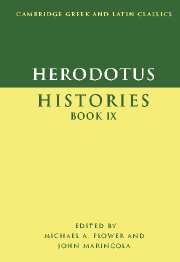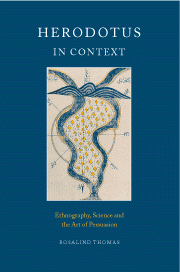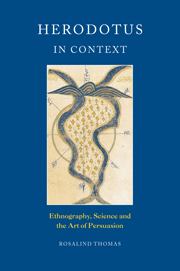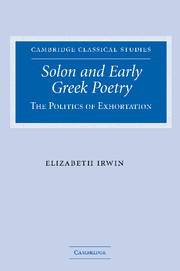Reading Herodotus
Reading Herodotus is a 2007 text which represented a departure in Herodotean scholarship: it was the first multi-authored collection of scholarly essays to focus on a single book of Herodotus' Histories. Each chapter studies a separate logos in Book 5 and pursues two closely related lines of inquiry: first, to propose an individual thesis about the political, historical, and cultural significance of the subjects that Herodotus treats in Book 5, and second, to analyze the connections and continuities between its logos and the overarching structure of Herodotus' narrative. This collection of twelve essays by internationally renowned scholars represents an important contribution to scholarship on Herodotus and will serve as an essential research tool for all those interested in Book 5 of the Histories, the interpretation of Herodotean narrative, and the historiography of the Ionian Revolt.
- Was the first scholarly volume devoted to Book 5 of the Histories
- Contributors include many of the leading international scholars working on Herodotus and Greek historiography
- Offers insights into the history and historiography of the Ionian Revolt
Reviews & endorsements
"The thick but narrow focus of the volume as a whole makes it a must-read for Herodoteans, though historiographers and Greek prose specialists too will profit from a careful study of it with Book 5; and certainly, any scholar researching any passage in Histories 5 will have to consult it (with the aid of its excellent index locorum)." --BCMR
Product details
July 2011Paperback
9780521201025
360 pages
229 × 152 × 20 mm
0.53kg
Available
Table of Contents
- Introduction Elizabeth Irwin and Emily Greenwood
- 1. 'What's in a name?' and exploring the comparable: onomastics, ethnography and kratos in Thrace (5.1–2 and 3–10) Elizabeth Irwin
- 2. The Paeonians:
- 5.11–17 Robin Osborne
- 3. Narrating ambiguity: murder and Macedonian alliances:
- 5.17–22 David Fearn
- 4. Bridging the narrative:
- 5.23–7 Emily Greenwood
- 5. The trouble with the Ionians: Herodotus and the beginning of the Ionian Revolt (5.28–38.1) Rosaria Munson
- 6. The Dorieus episode and the Ionian Revolt:
- 5.42–8 Simon Hornblower
- 7. Aristagoras:
- 5.49–55.97 Christopher Pelling
- 8. Structure and significance:
- 5.55–69 Vivienne Gray
- 9. Athens and Aegina:
- 5.82–9 Johannes Haubold
- 10. 'Saving' Greece from the 'ignominy' of tyranny? The 'famous' and 'wonderful' speech of Socles John Moles
- 11. Cyprus and Onesilus: an interlude of freedom (5.104, 108–16) Anastasia Serghidou
- 12. The Fourth Dorian Invasion and the Ionian Revolt (5.76–126) John Henderson.






